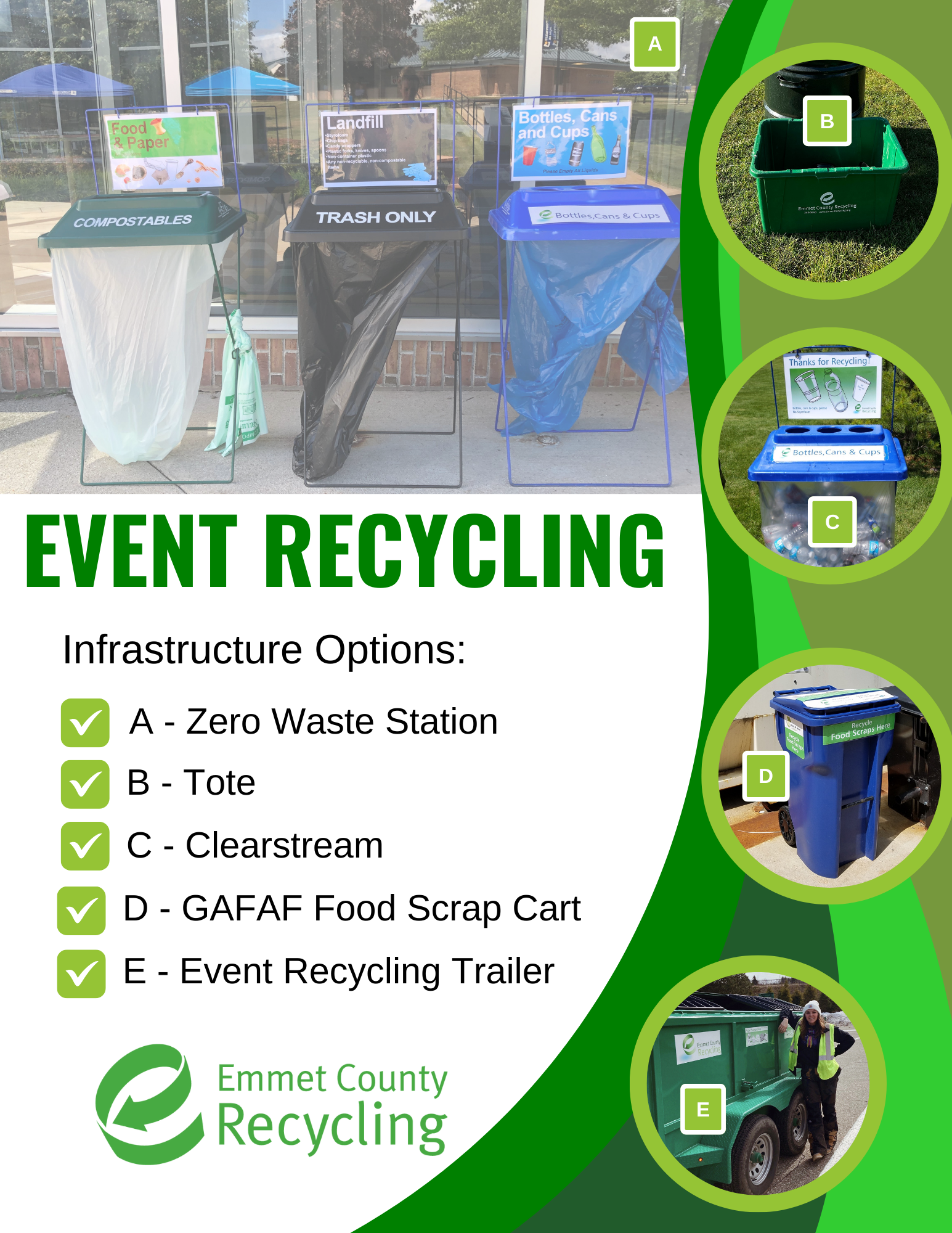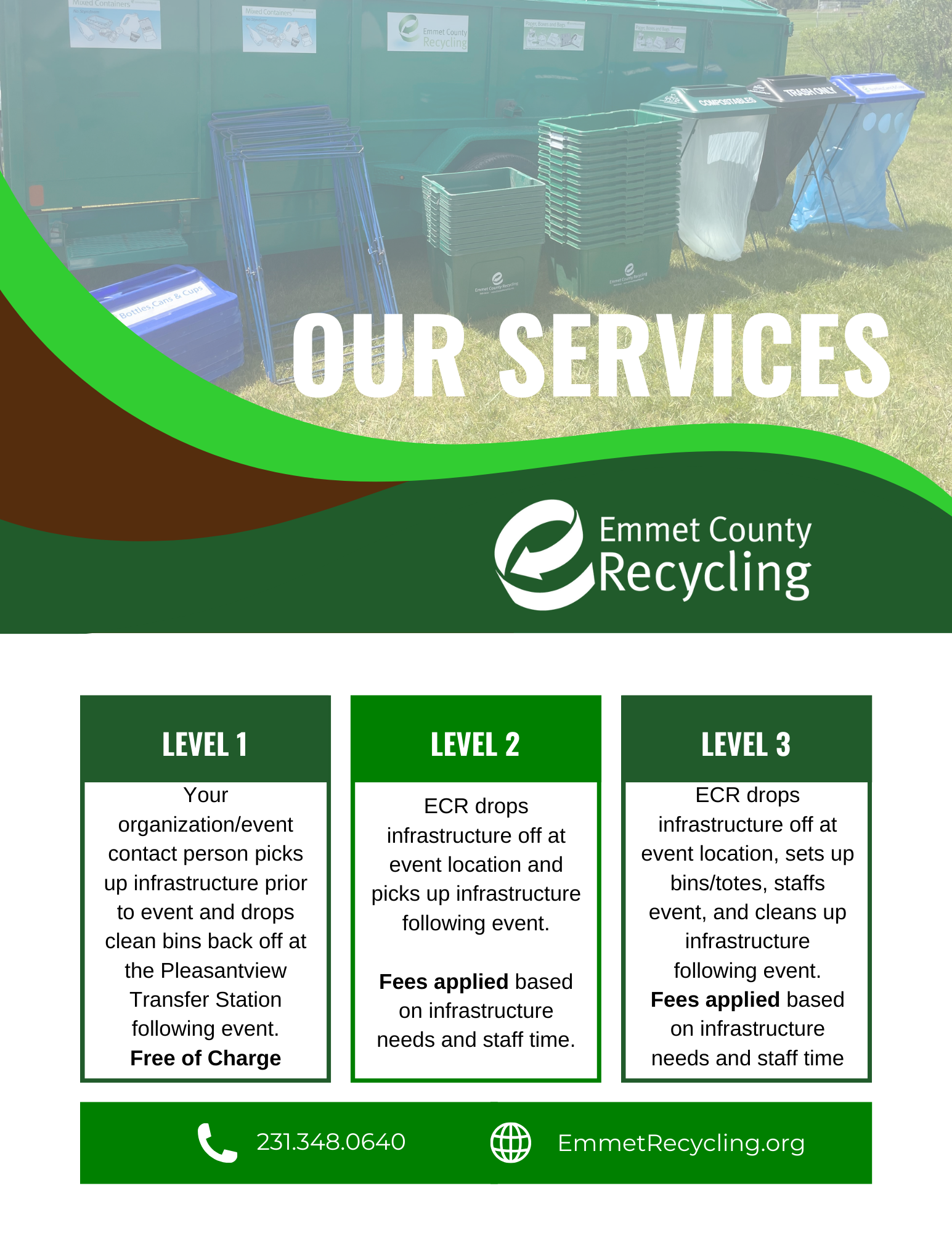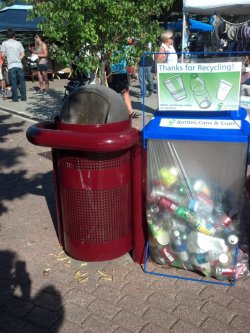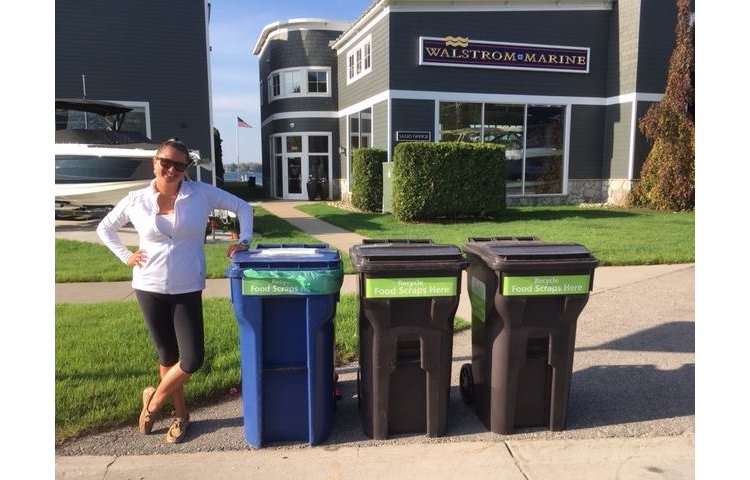Event Recycling Services from Emmet County Recycling
Emmet County Recycling offers three levels of service for your event. Call us today at 348-0640 to discuss the details of your event, or fill out the form below and email it back to [email protected]! Once your event reservation form is confirmed, someone in the office will contact you to coordinate the pick-up/delivery of the recycling infrastructure for your event.
Event Recycling Contract Event Recycling Flyer


Working Towards a Zero Waste Event
Working towards a zero waste event can help you reduce your garbage costs, can contribute to your brand (over 80% of Emmet County households recycle!), and can set an example for other events in our community.
What is Zero Waste?
Making Your Event 'Zero Waste'
Contact us 2-3 months in advance
Whether you’re planning a potluck for members of a group or the most elegant catered wedding, please contact us 2-3 months in advance of your event. This will allow time to think your waste situation through, identify supplies needed, and coordinate with everyone involved.
This also helps ensure we are able to help you out with your event: Each year our calendar fills up with event recycling requests, and we want to ensure we have the resources for your event too!
Create Menu and Identify Waste Streams
Most of the waste at events is generally associated with food, be it packaging, serving ware, or actual food scraps.
The food itself:
Buy in food in bulk to reduce quantity of single use/single serving packages
For example…
Buffets are notoriously wasteful because bowls and trays are refilled to keep them looking attractive and, offered abundance and variety, people often put far more than they can eat on their plate. Consider limiting the number of items and displaying them in smaller containers to reduce the amount of food that will be waste. If it fits the style of your event, be prepared with “take out” containers so the guests can take home some of the leftovers.
How the food will be served:
A little forethought goes a long way in reducing the waste an event generates. When creating your menu, think about how each food will be served and the serviceware. If you are working with caterers, food trucks or other vendors, let them know that reducing waste is one of your priorities.
For example…
If small bites are going to be served at the event, make sure whatever they are served in is compostable. This is because small plastic items such as little cups and utensils are too small to recycle. Avoid plastic skewers and frilled toothpicks.
Best: Reusables or durables
- giving each guest a souvenir glass to reuse throughout a wine-tasting event
- asking people to bring their own place settings to a potluck (this is coming into fashion again!)
- rented china, flatware, and cloth napkins at a wedding
Better: Compostables
- paper plates, napkins, bamboo utensils (or none at all) and compostable paper cups if composting too
Good: Recyclables
- Recycle plastic cups, ice bags, glass bottles, and aluminum cans
Beware: consider using compostable plastics only in close consultation with the people who will be composting them. Generally, the composter will need to okay the exact line of compostable plastics you are proposing to use. Many compostable plastics require conditions achieved only at the most advanced commercial composting facilities. Even if you can’t have all reusable serving ware, consider renting flatware for your event.
If you are using disposable products, use plastic or paper but NO STYROFOAM.
Identify waste stream management

Make sure you identify where the garbage, recycling, and food scraps will end up: In fact, it often works well to start backwards: contact local recycling and composting facilities before planning your service-ware so you will know in advance what they can recycle. Keep in mind “back of house” waste and recyclables generated by vendors, educate them and provide bins/buckets/etc and service for its management. Things will be more likely to be handled properly if you use visual cues such as recycling in clear bags and garbage in black bags.
Getting there: How will the compostables, garbage and/or recycling get to their next destinations? Will you haul the garbage and recycling? Will they fit in regular curbside recycling carts on site? Will you contract with Emmet County Recycling to haul the recycling?
Create signage and promotion materials
Emmet County Recycling is happy to provide customized signage for your event. Experience suggests that signs which fit the following work best:
- Visible from a distance: use 100 point type or larger for your main words
- Hung on the sides of the bins or walls and/or sign frames behind the bins. Signs on tops of containers aren’t visible until the viewer is looking right down on the bin and generally a person subconsciously decides which bin they are going to throw something in before they even approach it!
- Simple: Using just “Recycle,” “Compost,” and “Landfill” and pictures of the primary materials going in each receptacle works well.
Pro Tip: if you promote your event as a “green event” people will arrive expecting that there will be recycling bins and be more aware that not everything goes in the garbage. Social media, info printed on the tickets and promotional posters, and media releases are all good places to share that you will be hosting a “zero waste event”
Twin your bins

One of the most important pieces of advice for event recycling is to “twin your bins,” meaning pair each recycling bin with a trash can if your event will have materials meant for the landfill. If you know there will be outside products brought in, or will be serving food but not providing composting, it is important that your guests have a place for trash to go so the recycling does not become contaminated.
Train staff and volunteers
If your staff/volunteers understand the recycling and composting systems, they can help answer questions and make sure people are properly using the bins. If they are unsure what goes where, you could have a big mess at the end of your event!
Measure!
By measuring, you will have a baseline and be able to set goals for the following event. Knowing your diversion rates is always helpful when sharing your story too! Post success stories for your attendees to see the difference they made. Send us your stories and we will share it, and maybe use it as a case study!

